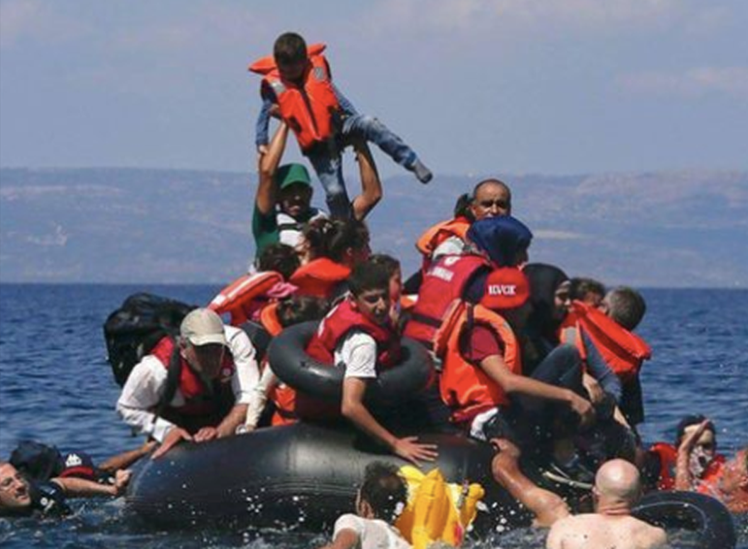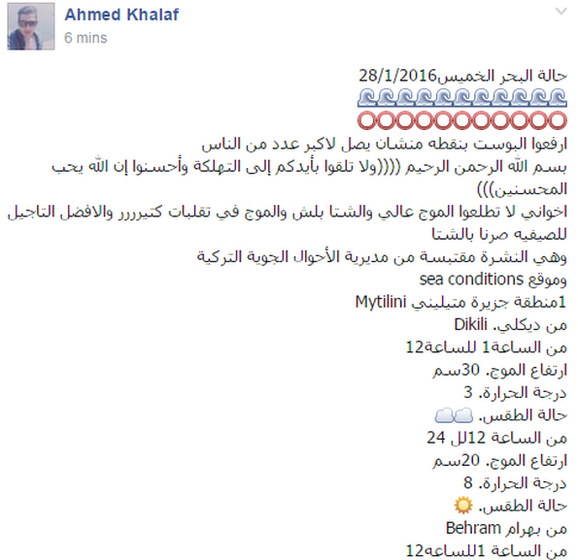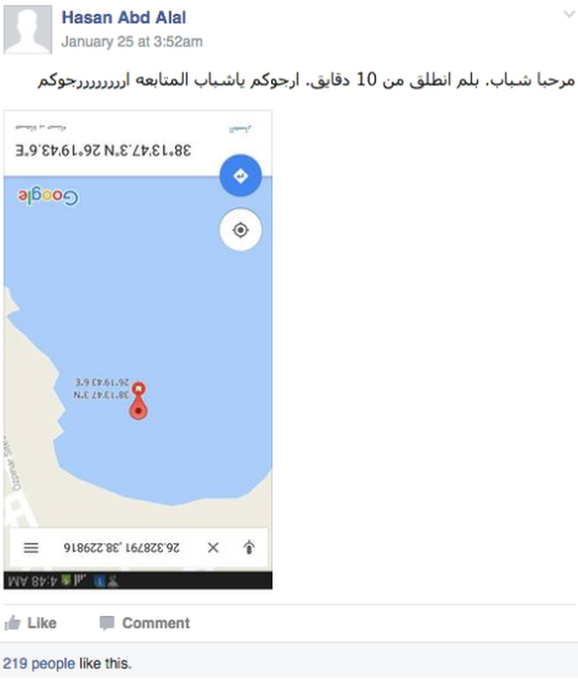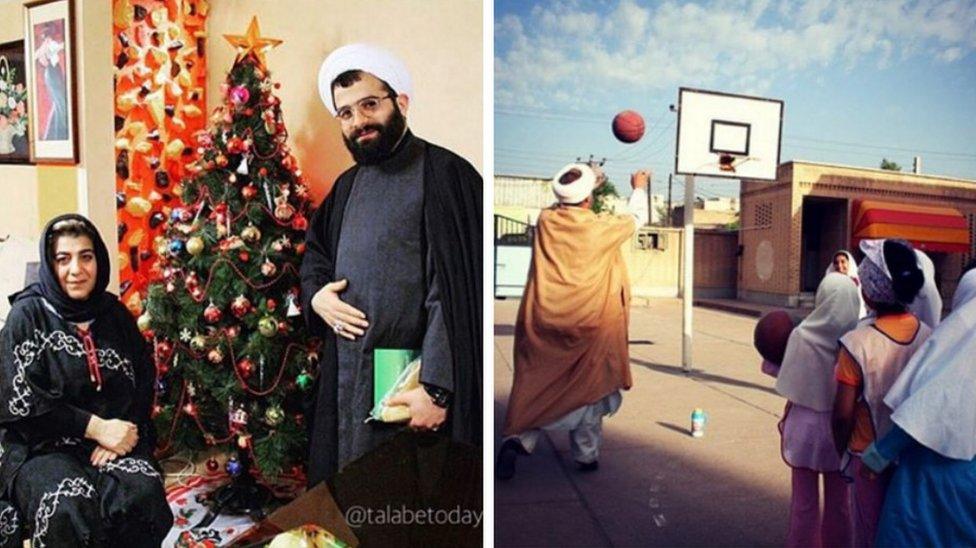'Boycott death boats'
- Published

This photo was posted on the Facebook page on 25th January with a caption urging people not to attempt sea crossings until Summer
"Please, warn the migrants not to take to the sea between Greece and Turkey, there are swirls in the sea and high waves that can bring ships down and the temperatures are really low too...Those who have decided to migrate, wait for the Summer. Boycott death boats."
This was the message posted in Arabic on a Facebook page set up by Syrians to help other Syrians, who are contemplating making the treacherous sea journey to northern Europe. It accompanied a photo showing men desperately swimming around a perilously overloaded dinghy onboard which a child is being held aloft to keep them safe.
Last weekend, a week after the warning was posted, there was yet more evidence of the horrific consequences of not staying off the "death boats". At least 39 people drowned trying to cross the Aegean Sea after their boat capsized near the Turkish resort of Ayvacik.
It's tragedies like this which the Facebook group in question, external, Karajat el-Meshantateen - which can be translated from the Syrian dialect as "Bus station for the wanderers" - tries to prevent.

Follow BBC Trending on Facebook
Join the conversation on this and other stories here, external.

The group was started in 2014 by few Syrians, who were planning to cross to Europe. "In the first day, we had only eight members. In the second day we were 100. People were telling friends and family who were planning the trip to join and this is how it started," says one of the group's administrators, Khaled Alhawary.
Now the group has more than 177,000 members making it one of the most successful social media groups for those seeking to cross the Mediterranean. Most of them are Syrians who have either made it to Europe or who are planning to, but there are also journalists, researchers, and filmmakers.
The administrators post a daily weather forecast with detailed information on wind and wave height on the Turkish and Greek shores of the Mediterranean. In the past weeks, the posts have often been dramatic urging people with children not to cross as the sea is to rough and it is too cold on the road.

The group posts a daily weather forecast for those thinking of crossing.
"In general, we don't encourage people to leave for Europe, it is a personal decision. But there are plenty of people out there who already took this decision so we help them to be safe," says Nour al-Halabi, one of the administrators, who is in charge of the group's monitoring team.
The monitoring team consists of 20 people scattered across Europe and the Middle East, who are working, often around the clock, to monitor the dinghy boats. "It usually starts with a post to the group page that someone is about to cross. We then ask via a private message for their WhatsApp number to stay in touch with them. If there are any problems, let's say with the engine or the boat, and they need help, we contact the Turkish or Greek coast guards and provide the coordinates," says al-Halabi.

"Hello guys. A dinghy boat left 10 min. ago. Please follow pleeeeeaaaaaase," said this geo-located post from a Syrian who wanted the monitoring group to keep track of a boat.
All of those involved are volunteers. Often the administrators have personal stories that push them to do this type of work. Al-Halabi, for example, tried to cross the sea four times. He almost drowned during his last attempt. "Back then, there was no monitoring group or anything. There were approximately 28 people with me on the boat, only 11 survived. I was drifting in the sea for four hours and a half before the Turkish guard noticed us and rescued the survivors," he says. "I lived this experience of being in the sea and this is why I know how important it is that there is someone following you, who cares about what happens to you. It gives you comfort." Al-Halabi himself abandoned the idea of living in Europe and works now in one of the Gulf countries.
The group has few rules: it is forbidden to share contact information for smugglers but also political or religious posts ''to avoid tension between group members''. The group's description on Facebook says: "As the war in Syria entered its fifth year and the humanitarian situation is deteriorating, millions of Syrians were pushed to leave to save their lives and dignity, searching for safety not available in their country."
The description adds: "Many Syrians chose the deadly roads, full of danger and they don't know these paths so it is important to get advice from those who tried before them. And from here came the idea. We ask those with experiences to be generous with their advice to their countrymen and we ask God to bring relief for us and for our homeland so we return to it safely."
For some members, the group has almost become a virtual family where they share their news about a relative who has died after finally making it to Europe. Others use the page to share pictures of loved ones who they have lost contact with on the Turkish or Greek shores, in the hope that others may have some information about them. But they also share jokes and good news: safe arrival, photos from language lessons, or pictures of their newly obtained residency in Germany or Sweden.
Recently one man asked in a post: "Question to everyone: if the situation in Syria will be resolved and things calm down God willing would you return and accept the country's condition with the aftermath of war?" The response was mixed, some answered: "Of course, we will return and rebuild it" others were sceptical that the conflict will ever end. One member predicted that children brought up in exile will not return.

In this cartoon a Syrian refugee asked about the Geneva talks to end the civil war, asks if Geneva will give him bread.
Often members of the group are facing difficult choices. I ask one member via a private FB message if he regrets that he left Syria. "I regret that I left my sick father behind and that I chose Sweden, which is difficult for family re-union. But I finished university and I was facing being conscripted to the army. If I stayed, I would be a killer or I would be killed. I didn't have a choice but to leave."
Although political discussions are not welcomed in the group, there is often evidence of a weariness and a simple desire for the civil war at home to be over. Recently, one member posted a cartoon by a Syrian cartoonist Juan Zero about Geneva talks, in which a journalist is asking a Syrian: "What do you think about Geneva" and the Syrian answers: "Do they give bread?"
Blog by Rima Marrouch
Next story: Instagram imams are unlikely online hit

Photos Islamic scholars playing basketball, making tea and doing other everyday activities have become a social media smash in Iran. READ MORE
You can follow BBC Trending on Twitter @BBCtrending, external, and find us on Facebook, external. All our stories are at bbc.com/trending.